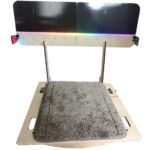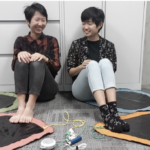
the Balance Number Line

The Magical Musical Mat

SignEd|Math
Abstract
Making learning media accessible to learners with non-majority sensory profiles is often conceptualized as presenting information in an alternate format, such as providing blind students with auditory descriptions of visual images. However, emerging evidence from the embodiment turn in the cognitive sciences challenges the assumed equivalence of content presented in different formats, suggesting instead that the nature of our bodily engagements with the world shape our cognitive structures. We propose that it is necessary to rethink accessibility from this new theoretical perspective. The result of this perspective is a new framework for instructional design accessibility and design-based research, which we term Special Education Embodied Design (SpEED). SpEED reimagines the reciprocal relations among the media (virtual and material substrates), modalities (activated sensorimotor systems), and semiotic modes (meaning-making systems) of instructional designs, setting forth from learners’ existing embodied resources.
In this talk, we present three SpEED design-based research projects that center different populations of learners: students on the autism spectrum, Deaf students, and students with high sensory regulation needs. SignEd|Math recruits signs’ potential to be iconic and grounded in action to enhance Deaf students’ learning of mathematical concepts from tablet-based interaction and collaborative discourse. The Magical Musical Mat recruits the modality of touch to facilitate non-speaking autistic students’ participatory sense-making and spontaneous interaction. The Balance Number Line recruits the sensory-regulatory behavior of rocking on a balance board to support students with high sensory regulation needs in learning negative numbers and absolute value concepts. By comparing and contrasting these projects, we reflect on implications for embodied design and the future of epistemological equity in instructional design.
About the speakers
Sofia Tancredi and Rachel Chen are doctoral students in the Joint Doctoral Program in Special Education at UC Berkeley and San Francisco State University. Dr. Christina Krause is a postdoctoral Marie Skłodowska Curie fellow at UC Berkeley and the University of Duisburg-Essen, Germany. Each works with a distinct population served by the Special Education system and on a distinct research focus: Sofia Tancredi researches sensory regulation amongst students who seek high levels of vestibular activation, including many learners with ADHD and learners on the autism spectrum. Rachel Chen researches embodied autistic interaction amongst nonverbal students on the autism spectrum. Dr. Christina Krause researches the role of gesture and sign language in mathematics discourse amongst students who are Deaf signers. The three are brought together by a shared commitment to equitable education that goes beyond physical access to consider epistemically equitable opportunities to conceptual understanding: the need for SpEED.
Zoom Details
Host:
The Fall 2020 SESAME Colloquium Series. The Graduate Group in Science and Mathematics Education (SESAME) and the Graduate School of Education invite you to an exchange of ideas and innovations in education.
Date and time:
Friday November 13th, 3:00–4:30 PM
Zoom link:
https://berkeley.zoom.us/j/93423374351?pwd=SEE2OWQ0MnNDRXEzZjJXc3NrZWVMUT09
Meeting ID:
934 2337 4351